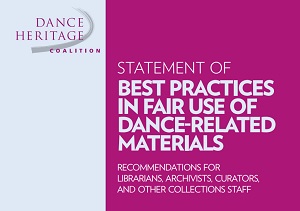Artist’s Legacy Toolkit: Copyright
Navigation Menu
- Archiving & Preservation
- Artist’s Legacy Toolkit
- Artist’s Legacy Toolkit: Access
- Artist’s Legacy Toolkit: Copyright
- Artist’s Legacy Toolkit: Digital Files
- Artist’s Legacy Toolkit: Identify
- Artist’s Legacy Toolkit: Organize
- Artist’s Legacy Toolkit: Preserve
- Artist’s Legacy Toolkit: Intro to Records Management
- Artist’s Legacy Toolkit: Resources
- Artist’s Legacy Toolkit: Using the Toolkit
-

Copyright Law: Essential Points to Know
Copyright law is the protection of artistic expression.
Copyright law in the United States was developed to incentivize the creation of new works by protecting the rights of creators to use and profit from their works.
To be protected by copyright, a work must be an original work of authorship fixed in a tangible medium of expression. Facts, concepts, processes, and discoveries cannot be copyrighted. For dance, a work must be notated or video-recorded in order to be copyrighted. Lighting plots, designs, and written notes are also copyrightable.
Copyright and Art-Making
Who Owns the Copyright? Generally, the person who created the artistic expression is the owner of the copyright. For example, the painter owns the rights to the painting he created. The person who wrote the letter is the copyright owner, not the recipient of the letter. However, sometimes the person who created the work is not the rights holder because of a contract or employment situation. Please read employment contracts to make sure that you are not unintentionally transferring your rights to your employer.
What Does It Mean When You Own a Copyright? If you own the copyright to a work, no one else may use, reproduce, disseminate, or perform the work without your permission. This does not, however, prevent uses that fall under the Fair Use Doctrine, such as when others use your work for teaching, scholarship, research, and criticism. Like the teacher who copies a poem to distribute to his class and the movie critic who quotes the movie in her scathing review, the Fair Use Doctrine prevents copyright law from squelching our freedom of speech. For a helpful guide to fair use, check out the Statement of Best Practices in Fair Use of Dance-Related Materials.
If I Own the Physical Item, Do I Own Its Copyright? Please be aware that ownership of the physical item does not equal ownership of the copyright. For example, if you own a Degas painting, you do not also own the rights to make copies of the painting and sell them. Under the First Sale Doctrine, you are allowed to sell physical items on Ebay or donate them to museums; you would just not have any copyright ownership in the item to transfer (and so the new owner may not make copies and sell them either).
Copyright and Collection Transfer
What Happens to My Copyrights After I Die? Like property, copyright ownership passes to your heirs. It is best to have a will or some kind of document describing the disposition of your assets, including the explicit transfer of your intellectual property.
To Whom Should I Bequeath My Copyrights? If you have many potential heirs, please rethink bequeathing your copyright to be shared among many. If one heir attempts to donate your materials to an archive, the archive might require permission from all owners. Please also consider bequeathing your copyrights to an archival institution. Take a look at the Elder Artists Legal Resource for detailed advice and tools for protecting your work and materials after your death.
Copyright and Estate Planning
Does Giving My Records to an Archive Mean I Am Giving Up My Copyright? Not necessarily. In donating your records to an archive, you will most likely have the opportunity to choose what happens to your copyright.
Why Would an Archive Want My Copyrights? To meet their mission, libraries and archives may request for you to transfer your copyright in the physical materials you are donating. Libraries are interested in having the ability to give unencumbered permission to researchers and scholars. By transferring ownership, the libraries can meet their mission to make historical records accessible to the public.
How Do I Transfer My Copyrights to an Archive? Generally you will sign a Deed of Gift. This Deed includes your name, the archive’s name, a title and description of the materials donated, and a transfer of ownership. You will also need to consider what happens should the archive not exist anymore. Where should your materials be transferred?
How Do Contracts Affect My Ability to Transfer Copyright? A contract you have signed previously may prevent you from later transferring your copyright. Perhaps you have transferred your copyright to your employer and only retain a license to use your own work. However, limitations on your own usage of an item do not transfer to a library’s usage of the work.
Suggested Copyright Resources
- A Guide to Clearing Rights for the Performing Artist from the Research Center for Arts and Culture and The Actor’s Fund.
- Clearance & Copyright: Everything You Need to Know for Film and Television by Michael C. Donaldson
- Reclaiming Fair Use: How to Put Balance Back in Copyright by Patricia Aufderheide
